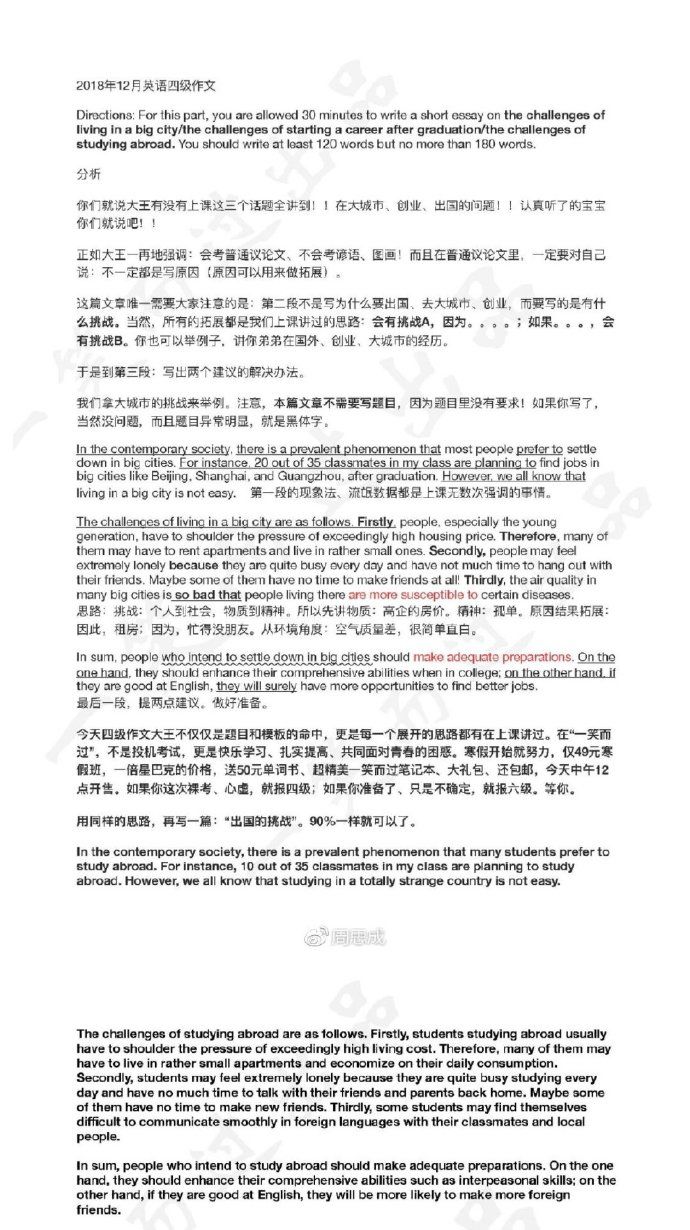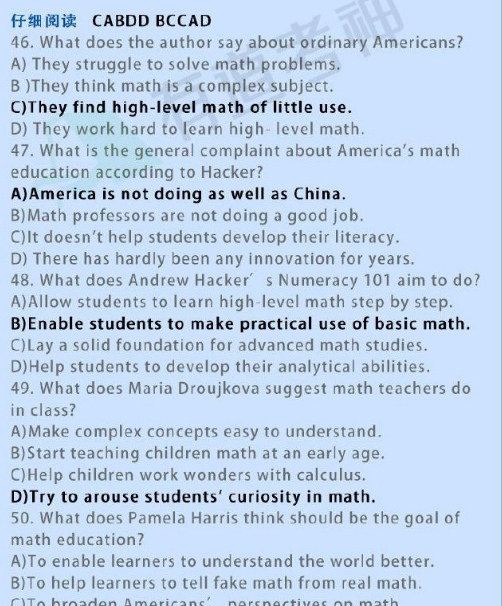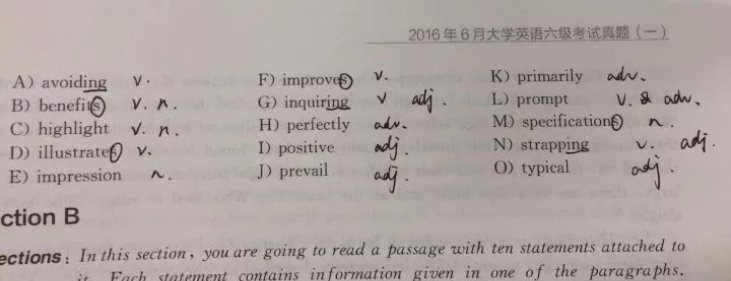自考“英语(一)”笔记 二十三
|
Text A Diamonds 本课主要单词 1. rare adj. 稀有的,难得的 These animals are so rare that I would do whatever I can to save them. 〔这些动物很稀有,我会尽我所能去保护它们。〕 On the rare occasions when the old lady had any post, the little boy downstairs would go and get it for her. 〔老太太难得有信,只要有信总是楼下的小男孩帮她去拿。〕 Snow is rare in this part of China.〔中国的这个地区难得下雪。〕 It is very rare for him to say “Sorry” to any others.〔他难得会对任何人说“对不起”。〕 Believe it or not, she is a rare beauty.〔信不信由你,她是一个百里挑一的美人。〕 a rare word〔冷僻的词〕 rare metals〔稀有金属〕 a rare disease(罕见的疾病)a rare medicinal herb〔珍奇药草〕 2. substance n. 物质;实质;大意;根据 They were trying to remove harmful substances from the soil.〔他们正设法去除土壤里的有害物质。〕 Ice, snow and water are the same substance in different forms.〔冰、雪、水是同一物质的三种不同形式。〕 What was the point of going to a lecture with little substance? 〔去听一个没有什么内容的讲座有什么意义呢?〕 What he is saying in substance is that we should take effective measures to prevent pollution. 〔他大体上说的是我们应该采取有效措施防止污染。〕 There was no substance in his complaints.〔他的抱怨没有道理。〕 3. slight adj. 轻微的;纤细的 Mother said she had a slight headache.〔妈妈说她有点头疼。〕 I didn't have the slightest idea about what had happened.〔我一点都不知道发生了什么事。〕 His chances of winning the election are very slight.〔他在选举中获胜的可能性极小。〕 He is too slight to play football.〔他太纤细,不能踢足球。〕 4. extreme adj. 极端的,极度的;尽头的n. 极端 He died in extreme poverty.〔他在极度贫困中死去。〕 You have to proceed your work with extreme caution.〔你得极其谨慎地继续你的工作。〕 Extreme action will be taken if necessary.〔如有必要,我们将采取最严厉的行动。〕 His hospitality was carried to an extreme.〔他好客得过分了。〕 She found the book uninteresting to the extreme.〔她觉得那本书没意思透了。〕 extreme joy/pain 〔极度的欢乐/痛苦〕 an extreme of sadness〔极度伤心〕 go from one extreme to the other〔从一个极端走到另一个极端〕 go to the other extreme 〔走到另一个极端〕 in the extreme〔极度,非常〕 extremes of poverty and wealth〔贫富的两极〕 5. pressure n. 压力,压强 The water pressure may need adjusting.〔水压可能需要调整。〕 It was a pressure of five tons per square meter.〔每平方米的压力为五吨。〕 Heavy study load and great expectation from parents may give children too much pressure. 〔沉重的学习负担以及家长的过高期望可能会给孩子太大的压力。〕 He was under constant pressure from his superiors.〔他的上司不断地给他压力。〕 The doctor said this medicine could counteract his high blood pressure.〔医生说这种药能遏制他的高血压。〕 6. liquid adj. 液体的,液态的;清澈的,明亮的n. 液体 The doctor put the patient on a liquid diet.〔医生规定那位病人吃流质。〕 The little girl with large liquid eyes is my sister.〔那个长着一双水汪汪的大眼睛的小姑娘是我妹妹。〕 She poured out a large quantity of yellowish liquid from a bottle.〔她从一个瓶子里倒出了许多黄色的液体。〕 7. crack n. 裂缝v. 破裂;打开 She found a crack in one of the tea-cups.〔她发现一只茶杯上有裂缝。〕 He heard the cracks of rifle fire in the distance.〔他听到了远处的步枪声。〕 He asked his mother to crack some eggs for him.〔他请妈妈帮他敲碎几个鸡蛋。〕 His face cracked with a broad smile. 〔他咧开嘴笑了。〕 The phone cracked the room's quiet.〔电话铃声打破了房间的寂静。〕 They were unable to crack a highly competitive sales market.〔他们无法打进竞争激烈的销售市场。〕 8. crust n. 地壳;面包皮,外皮 There are some brownish bread crusts on the dining table.〔餐桌上有一些棕色的面包皮。〕 The white snow had a fine crust on the trees.〔树上覆盖着一层美丽的白雪。〕 The continuous movements of the earth's crust may lead to earthquakes.〔地壳的不断运动引发了地震。〕 It is very dangerous to walk on the thin crust of ice.〔在这样一层薄冰上行走是很危险的。〕 9. crystal n. 水晶;晶粒adj. 清澈透明的 Mother gave her a necklace of crystals as a birthday present.〔妈妈给她一条水晶珠项链作为生日礼物。〕 The old woman looked into the crystal ball for a while before telling my fortune. 〔老妇人朝水晶球里看了一会,然后给我算命。〕 I've made my point crystal clear that I would never agree to such a proposal. 〔我已经表明了我的观点,绝不同意这个提议。〕 10. popular adj. 流行的,大众的;普及的;受欢迎的 Popular music is well liked by young people.〔流行音乐深受年轻人的喜爱。〕 Swimming is a sport popular with people of all ages.〔游泳是老老少少都喜欢的体育运动。〕 He has always been popular with / among boys in his community. 〔他一直广受他那个社区的男孩子们的喜欢。〕 This restaurant offers meals at popular prices.〔这家饭店供应价格大众化的饭菜。〕 He is a good politician but he is not very popular among the people.〔他很会搞政治,但是不得民心。〕 11. handful n. 一把,一小撮 He told the doctor that his hair fell out in handfuls.(他对医生说他的头发一把一把地脱落。) The naughty boy gathered a handful of stones and began to throw them in the lake. 〔那个调皮的男孩手里聚了一把石块,并把石块往湖里扔。〕 He gave me nothing except for a handful of books.〔除了少量的几本书他什么也没给我。〕 注意:一般来说,-ful是一个形容词后缀,加在名词后面可以构成形容词,比如:careful,helpful,useful,hopeful等等。而在handful这个单词中,-ful是一个名词后缀,加在某些名词的后面,表示“充满…所需的量”,比如:roomful,basketful,mouthful,spoonful等等。 12. formation n. 岩层;形成,构成 Most diamonds are mined from rock formations inside the earth. 〔大多数钻石都是从地下的岩层里开采出来的。〕 The formation of good habits is very important for a child.〔好习惯的养成对孩子来说很重要。〕 The teacher is explaining to the students the formation of the new word. 〔老师正对学生们解释那个新词的构成。〕 The peculiar formation of human brain drew the attention of researchers in many fields. 〔人脑的奇特构造吸引了许多领域的研究人员。〕 13. pipe n. 管子,导管;烟斗 v.用管道输送 Tell the pipelayer that he has to be careful with the gas pipe.〔告诉管道安装工煤气管道要小心。〕 The old man was sitting in the corner smoking a pipe.〔那个老人坐在角落里抽着烟斗。〕 It won't be very troublesome to pipe water into the house.〔用管道把水送进屋里不会很麻烦。〕 14. somewhat adv. 稍微,有点 It is somewhat difficult for him to answer the question.(要他回答这个问题有点难。) I felt somewhat awkward when I couldn't remember his name.〔当我记不起他的名字时,我有点尴尬。〕 The working conditions in this factory have somewhat improved.〔这家工厂的工作条件已有所改善。〕 |








